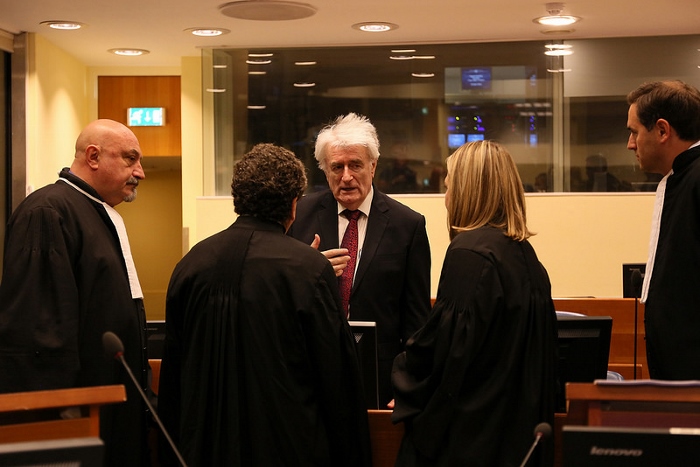Home
KARADŽIĆ APPEALS FOR ACQUITTAL OR RETRIAL
The Appeals Chamber in the case of former Republika Srpska president Radovan Karadžić today heard the arguments of the Defence to reverse the Trial Chamber's judgement and to order an acquittal or a retrial
 Radovan Karadžić with his defence team
Radovan Karadžić with his defence team ''Only my acquittal can save face of this Tribunal“, said former president of Republika Srpska Radovan Karadžić in his 90-minute plaidoyer before the Appeals Chamber of the Mechanism for International Criminal Courts.
The Trial Chamber's sentence of 40 years imprisonment for genocide, crimes against humanity and violations of the laws and customs of war „created an unpresedented confusion“, believes Karadžić concluding that this appeal hearing is the last opportunity to correct that - or „there will be no international justice“.
He claims the first-instance judgement ''neglected the rights of the accused, misusedthe evidence, distorted the facts, hid the real causes of the war and presented its consequences as crimes“.
Former president of RS told the judges that he had been indicted and convicted simply because he allegedly ''unjustifiably“ kept reminding Serbs in Bosnia and Herzegovina of the genocide that had been committed against them and their fellow Serbs in Croatia during The Second World War. He believes that his warnings were justified not only in 1991 when ''horrible things were happening around (us) – anti-Yugoslavism, anti-Serbism, antisemitism“, but are justified today when „that ideology is being revived“.
In the war of the 1990's, the Serbs only ''defended the status quo, to remain in Yugoslavia, and did not need a joint criminal enterprise to achieve that“, he explained adding that the defence of the country was their constitutional and legal obligation, otherwise they would have been accused for high treason. The city of Sarajevo „was not terrorised by the Serbs, but by the Muslims whose intention was to provoke a military intervention“, Karadžić claimed.
The Bosnian Serbs strategic goal was not a „separation of nations“, as the judgement says, but a „territorial delineation“. He adds that the permanent removal of non-Serbs from the territory of the new Serb state is a „myth“, since the population that was temporarily removed from the zone of conflict has later returned.
Karadžić's counsel Peter Robinson challenged the finding of the Trial Chamber that the accused shared a joint intention to kill men of military age in Srebrenica.
The Prosecutor should have provided evidence that Karadžić not only new about the mass executions following the fall of Srebrenica, but also shared a specific genocidal intent to destroy the Bosnian Muslims in whole or in part. The conclusion that Karadžić shared that intent was groundless and based solely on uncorroborated testimony of Momir Nikolić, former assistant commander for security of the Bratunac Brigade of the Bosnian Serbs Army, who pleaded guilty for participating in the Srebrenica crimes.
Co-counsel Kate Gibson argued that the trial was not fair. The Prosecution has turned the „mega trial into a trial with the assumption of guilt“, and led the chamber to err by presenting an enormous indictment and vast quantities of evidence – 1,2 million pages before the trial and 550.000 more during the trial. In addition, 3279 adjudicated facts from other trials have been presented to the Chamber which formally acknowldged them. The burden of proof was thus transferred to the defence, Gibson said adding that the only way to correct those errors is to order a retrial.
The Prosecution dismissed all the arguments presented by the accused and his defence and prepares to argue on the second day of the hearing that Karadžić ought to be found guilty of genocide in seven B-H municipalities in 1992 and sentenced for life.
Linked Reports
- Case : Karadzic
- 2018-02-27 APPEAL HEARING IN THE KARADZIC CASE TO BE HELD END OF APRIL 2018
- 2017-02-01 EXPERTS CONTRADICT KARADZIC: TRIBUNAL'S DETENTION UNIT IS NOT 'CARCINOGENIC'
- 2016-07-22 PROSECUTION APPEALS AGAINST KARADZIC’S JUDGMENT AND SENTENCE
- 2018-04-24 THE PROSECUTION: GENOCIDE CONVICTION AND LIFE IN PRISON FOR KARADŽIĆ
- 2019-03-20 RADOVAN KARADŽIĆ GETS LIFE SENTENCE
